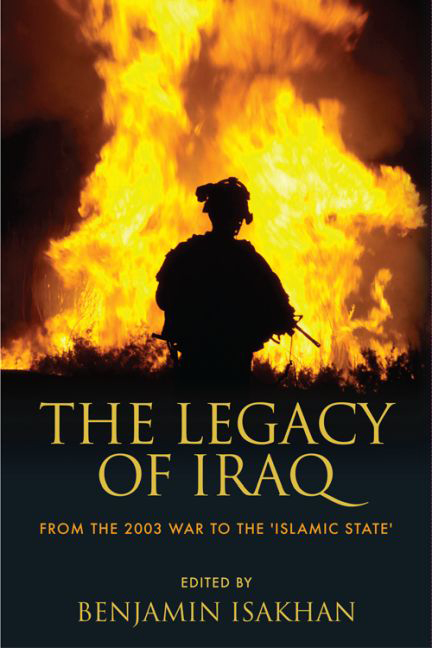Book contents
- Frontmatter
- Contents
- Acknowledgements
- Notes on Contributors
- Introduction: The Iraq Legacies – Intervention, Occupation, Withdrawal and Beyond
- Part I The Aftermath of War: Strategic Decisions and Catastrophic Mistakes
- Part II Iraqi Politics since Saddam
- Part III The Plight of Iraqi Culture and Civil Society
- Part IV Regional and International Consequences of the Iraq War
- Conclusion: The Iraq Legacies and the Roots of the ‘Islamic State’
- References
- Index
Introduction: The Iraq Legacies – Intervention, Occupation, Withdrawal and Beyond
Published online by Cambridge University Press: 25 October 2017
- Frontmatter
- Contents
- Acknowledgements
- Notes on Contributors
- Introduction: The Iraq Legacies – Intervention, Occupation, Withdrawal and Beyond
- Part I The Aftermath of War: Strategic Decisions and Catastrophic Mistakes
- Part II Iraqi Politics since Saddam
- Part III The Plight of Iraqi Culture and Civil Society
- Part IV Regional and International Consequences of the Iraq War
- Conclusion: The Iraq Legacies and the Roots of the ‘Islamic State’
- References
- Index
Summary
In March of 2003 the world's last remaining superpower launched a pre-emptive strike on a sovereign nation without UN approval or popular global support. The justification given to the world for such an attack was twofold: Iraq was accused of harbouring weapons of mass destruction (WMDs) and having links to al-Qaeda, neither of which could be permitted in a post-9/11 world. When, in the wake of the invasion, evidence failed to emerge for either Iraq's WMDs or links to terrorism, the Bush administration was forced to reframe the war and redefine the parameters of what would constitute victory. To do this, the United States and its Coalition partners undertook an ambitious and unprecedented project to turn Iraq into a liberal democracy, underpinned by free-market capitalism and constituted by a citizen body free to live in peace and prosperity. But the realities of Iraq fell well short of this idealistic vision. The Iraq War rapidly descended into chaos, causing heavy civilian losses and military casualties, along with shaky progress towards increasingly elusive goals. In 2006, any hopes that the world may have held when watching the ascension of Iraq's first democratically elected government were quickly dashed as a brutal and deadly ethno-religious sectarian conflict took hold. In the US, as well as in other Coalition countries, wide dissatisfaction with the motives and outcomes of the war brought heightened calls for a complete withdrawal. As Iraq's new political elite began to reveal their distaste for democracy, as violence continued, as supposedly vanquished enemies resurfaced and the people of Iraq struggled with poor electricity, limited potable water and crumbling infrastructure, the United States began withdrawing its forces. By December 2011 the US military had left Iraq, having failed not only to find WMDs or links to al-Qaeda, but also to deliver on their promise of a democratic, peaceful and prosperous Iraq.
- Type
- Chapter
- Information
- The Legacy of IraqFrom the 2003 War to the 'Islamic State', pp. 1 - 18Publisher: Edinburgh University PressPrint publication year: 2015



